Key takeaways:
- Hybrid events have gained traction, allowing for broader audience engagement and inclusivity.
- Sustainability and personalization are becoming essential trends in event management, resonating deeply with attendees’ values.
- Technology, including VR and mobile apps, is transforming attendee experiences and enhancing interactions.
- The future of event management will likely focus on sustainability, AI for personalization, and immersive technologies to foster connections.
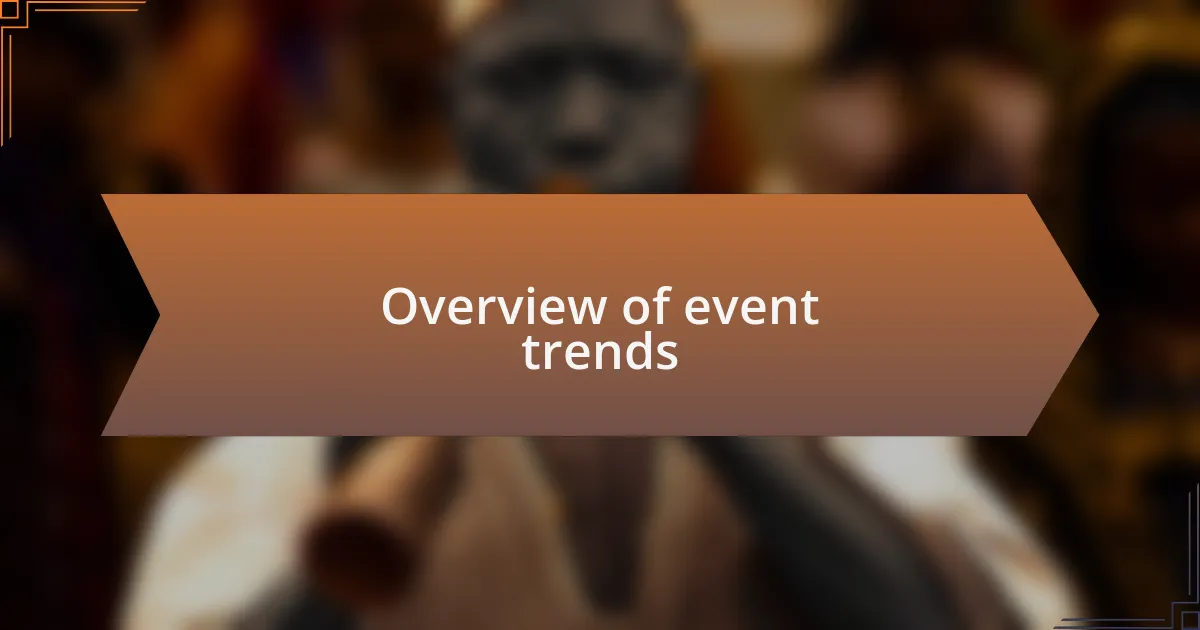
Overview of event trends
The landscape of event management is evolving rapidly, influenced by technology and shifting attendee expectations. I recall attending a virtual conference during the pandemic that opened my eyes to the potential of hybrid events. It was fascinating to see how seamlessly in-person and online participants interacted, making me wonder—could hybrid formats become the standard for future events?
As we look ahead, sustainability is becoming a non-negotiable trend. I remember organizing a small local event where we opted for eco-friendly materials, and the positive feedback was overwhelming. It made me realize that attendees today are not only looking for memorable experiences but also for events that reflect their values. Is it possible to create impactful events while being kind to our planet?
Moreover, personalization is increasingly crucial. I once attended a networking event where the organizers tailored experiences based on participant interests. This approach made every attendee feel valued and engaged, highlighting that understanding your audience can elevate an event from ordinary to extraordinary. Isn’t it time we all started prioritizing what truly matters to our attendees?
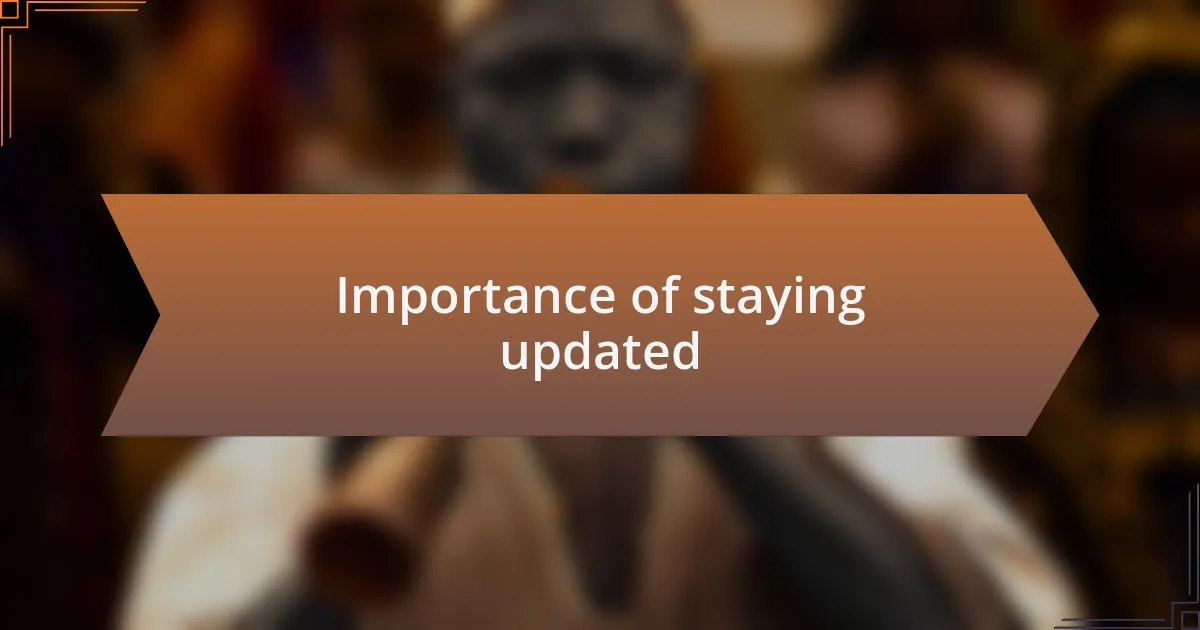
Importance of staying updated
Staying updated on event trends is vital for any event manager. I once missed a chance to incorporate a trending interactive technology at an event, and the turnout was underwhelming. Reflecting on that, I realized how crucial it is to stay informed; being aware of the latest innovations can significantly shape not only attendee engagement but also overall event success.
With the rapid pace of change in our industry, I often find myself wondering—how can we remain relevant if we don’t keep learning? I remember diving into workshops and online courses to understand tools and platforms that emerged during the pandemic. This constant thirst for knowledge allowed me to elevate my events and foster a deeper connection with attendees who now expect experiences that resonate with current trends.
Additionally, the unpredictability of attendees’ preferences makes staying updated even more significant. Just last year, I organized an event without fully grasping the rising interest in sustainability practices. The feedback from attendees was a stark reminder that to truly connect, we need to be in tune with what matters to our audience. So, do we really want to risk our events falling flat by ignoring the evolving landscape?
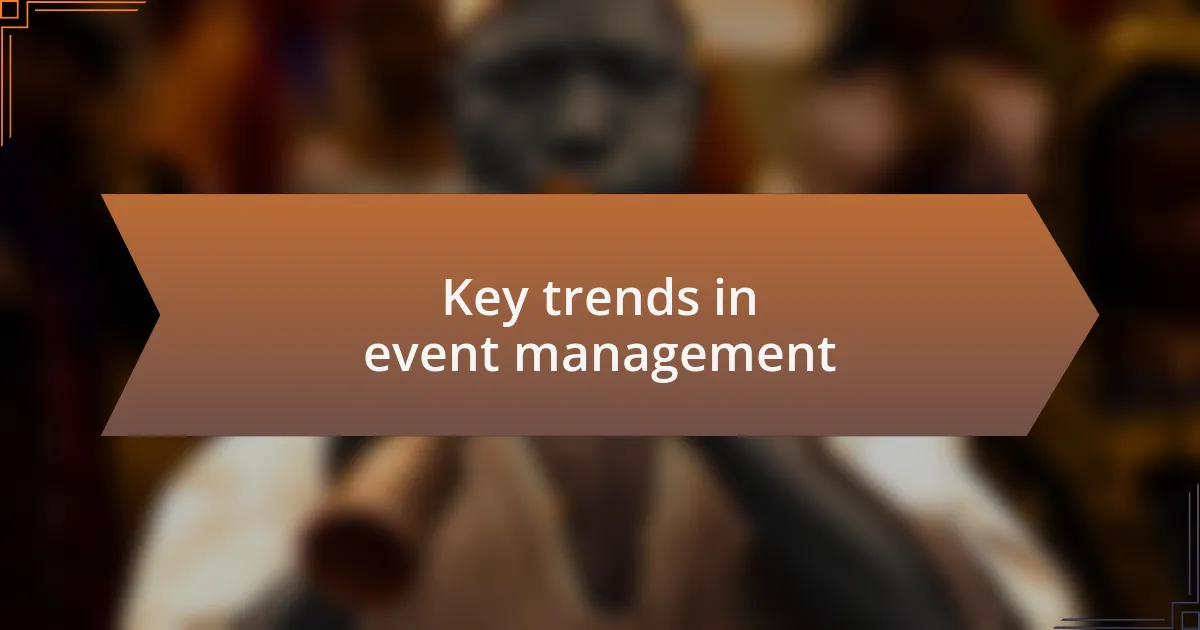
Key trends in event management
One key trend in event management that I’ve witnessed is the integration of hybrid experiences. During an event I hosted last year, I opted for a blend of in-person and virtual attendance options. The outcome was astonishing, as it allowed us to reach a broader audience and foster a sense of inclusivity. I couldn’t help but think, how many more people can we engage if we embrace this model moving forward?
Another trend is a heightened focus on sustainability, which has become non-negotiable. I still recall the warmth of feedback I received when I implemented eco-friendly practices at an event. Attendees appreciated the effort, and it sparked conversations about their own sustainable actions. It made me ponder: does your event stand out in a world that increasingly values conscious living?
Lastly, personalization is another emerging trend, and it’s all about making attendees feel special. A few months ago, I integrated custom experiences based on individual preferences for an event, resulting in a noticeable increase in engagement levels. I’ve often asked myself, how can we create memorable moments that resonate with each unique participant? The answer lies in curating tailored experiences that reflect their interests and needs.
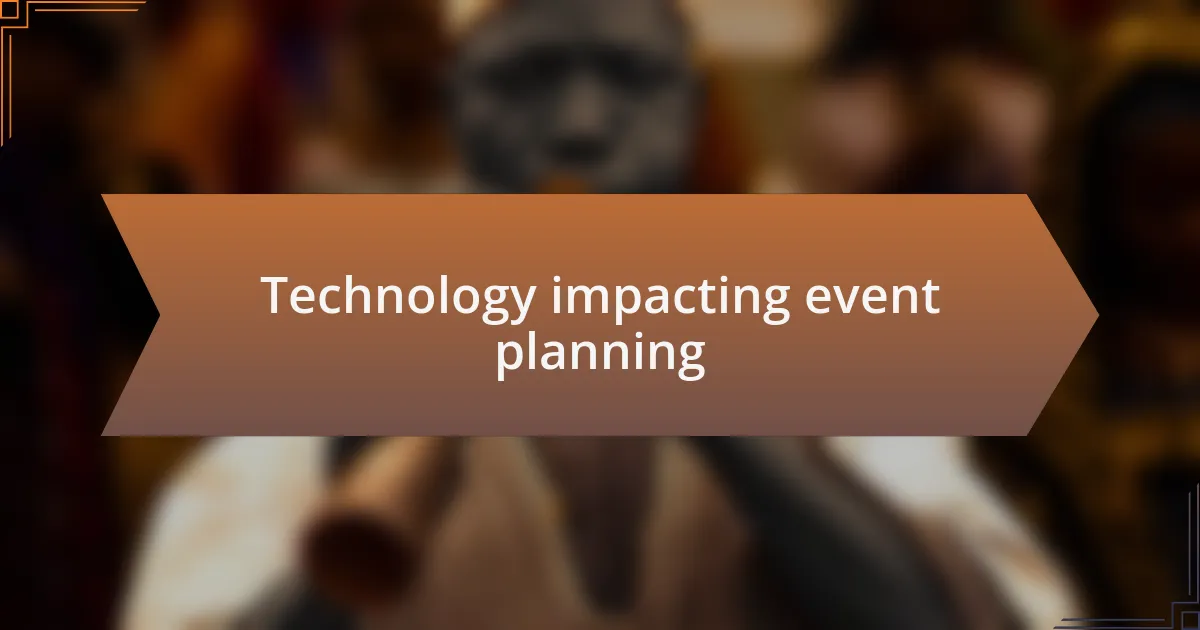
Technology impacting event planning
Technology has genuinely transformed how we approach event planning. I remember the first time I used event management software to streamline registrations, and it was a game-changer. Instead of drowning in a sea of spreadsheets, I was able to focus on enhancing the experience for attendees, which is ultimately what matters most, isn’t it?
One surprising impact has been the rise of virtual reality (VR) in event spaces. I recently attended a trade show that incorporated VR to give attendees an immersive experience of a new product. Watching people step into a digital world and engage with the product brought a new level of excitement and curiosity. It made me wonder, how can we continuously innovate to keep our audiences captivated?
Moreover, mobile apps have become indispensable in enhancing attendee interaction. At a recent conference, I discovered that integrating a dedicated app allowed attendees to network seamlessly and access real-time updates. This level of connectivity made it feel like everyone was part of a community, rather than just individuals in a room. How can we leverage such tools to cultivate connections that last beyond the event itself?
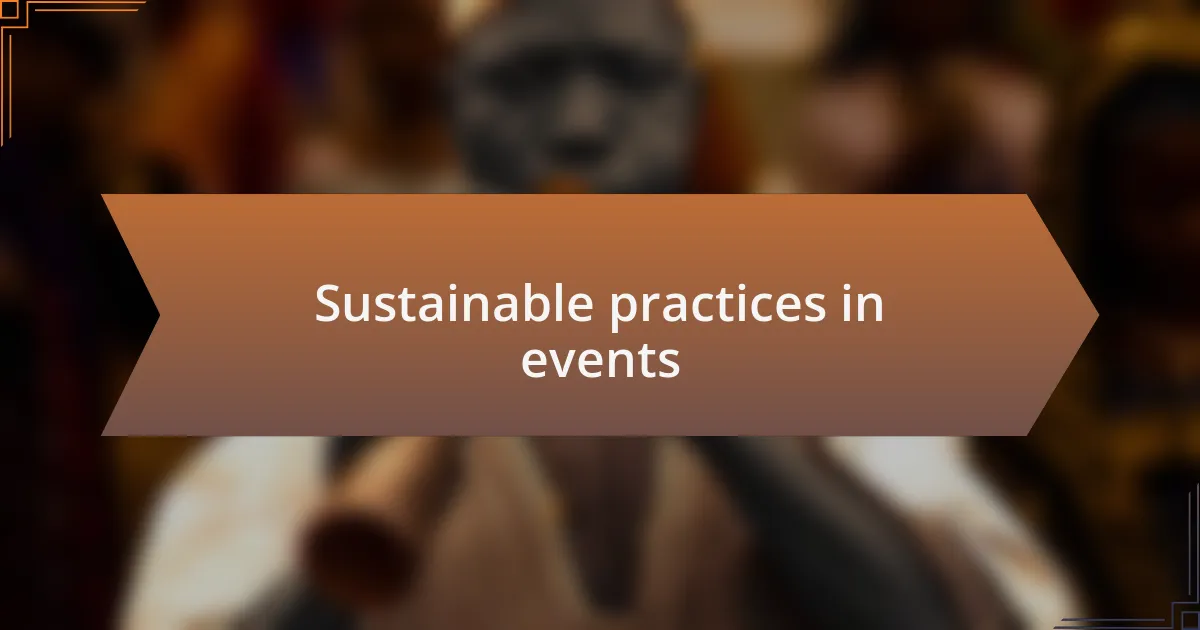
Sustainable practices in events
Sustainable practices in events are becoming essential, and I personally feel invigorated by this shift. One memorable experience for me was at an outdoor festival that fully embraced sustainability by using biodegradable materials for all their food packaging. Watching attendees engage with the concept made me realize that when we prioritize the planet, it not only benefits the environment but also resonates deeply with the audience.
I’ve also noticed how local sourcing of materials, like decorations and catering, significantly reduces carbon footprints. At a recent community event, the organizers partnered with local farmers and artisans, creating a vibrant atmosphere with a personal touch. It sparked conversations about supporting the local economy, truly illustrating how sustainability can foster a sense of community. Isn’t it remarkable how such practices can forge connections that go beyond the event itself?
Another compelling trend I’ve seen is the emphasis on digital tickets and online materials to minimize waste. I remember attending a workshop where attendees were encouraged to access all resources through a mobile app. It was refreshing to see so little paper used, and it made me ponder, how can we continue to innovate in this space to enhance our environmental efforts further? The potential is vast, and I firmly believe we’re just scratching the surface.
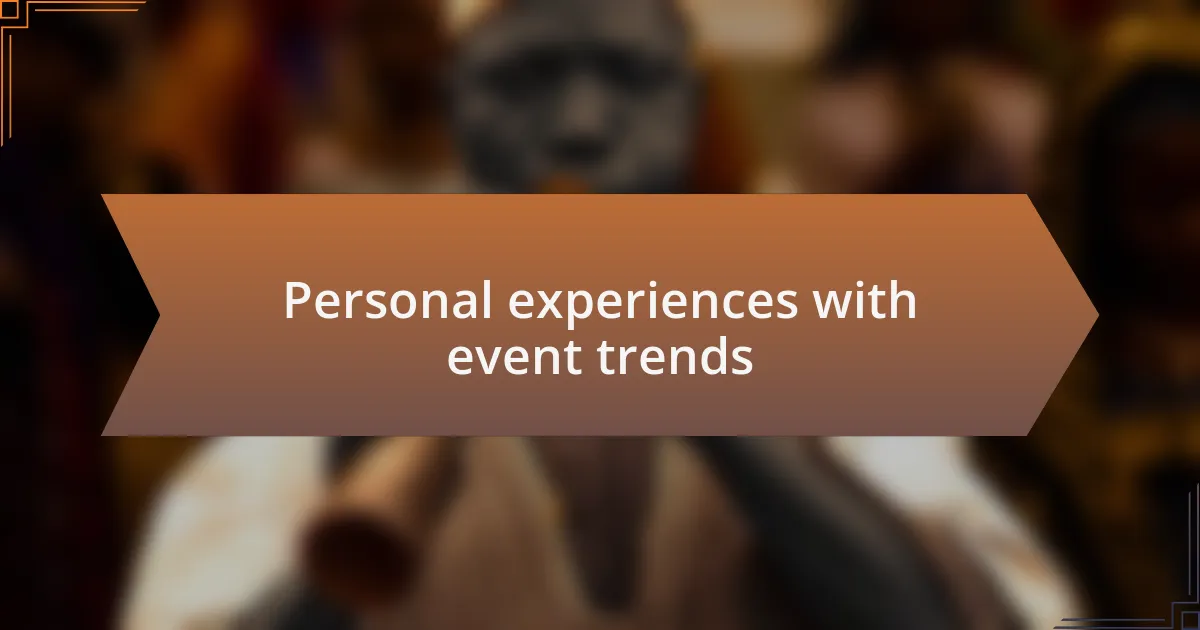
Personal experiences with event trends
At a tech conference I attended, I was struck by the integration of virtual reality experiences to engage attendees. I stepped into an immersive environment that showcased future trends in event technology. It was exhilarating to interact with the content in such a meaningful way, prompting me to wonder how we can harness VR to create even deeper connections between speakers and participants.
Another trend I’ve embraced is the rise of hybrid events, which allow for a wider reach. My team organized a seminar that included remote participants alongside those in the venue. I was amazed by how lively discussions flowed between online and in-person attendees, demonstrating that, with the right tools, we can cultivate community regardless of physical presence. Isn’t it inspiring how technology can break down barriers?
Reflecting on my recent experience managing an experiential marketing event, I realized how critical personalization has become. Tailoring activities to individual preferences led to a buzz of excitement among attendees, allowing me to witness firsthand how thoughtful planning can create memorable moments. Have we tapped into the full potential of personal experiences at events? It’s clear to me that as we continue to innovate, there’s much more to explore in fostering genuine connections.
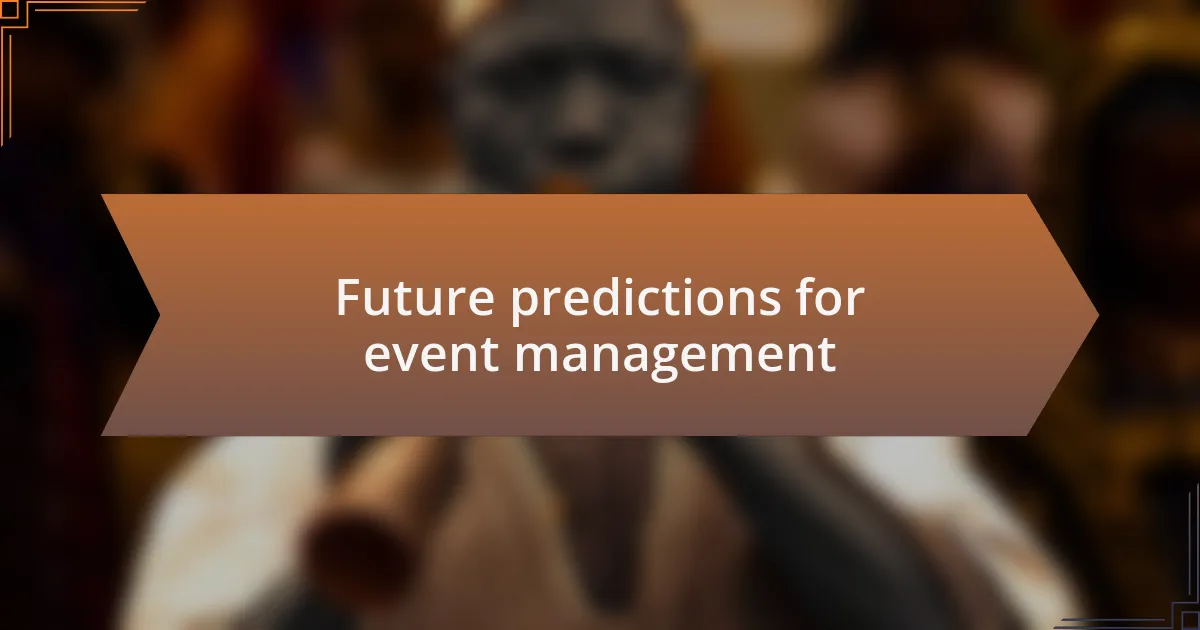
Future predictions for event management
As I look to the future of event management, I’m convinced that sustainability will take center stage. Recently, while attending a green technology symposium, I was inspired by how every aspect, from the venues to the swag bags, was designed with the environment in mind. It makes me wonder how we can incorporate these practices into our everyday events, ultimately leaving a lighter footprint on our planet.
I’m also excited about the role of artificial intelligence in shaping our future events. Imagine using AI to personalize attendee experiences in real-time, adjusting the agenda based on participant engagement and feedback. At a recent workshop I led, I saw how data analytics could optimize event outcomes, prompting me to think: how might AI refine not just the logistics but also the very essence of what makes events meaningful?
Lastly, I believe immersive technologies will redefine how we connect. Attending an augmented reality (AR)-enhanced networking event recently, I witnessed firsthand the spark of creativity that AR can bring to conversations. Can you envision a future where attendees interact with dynamic content while engaging with one another? This blend of imagination and connection is truly where I see events heading in the coming years.